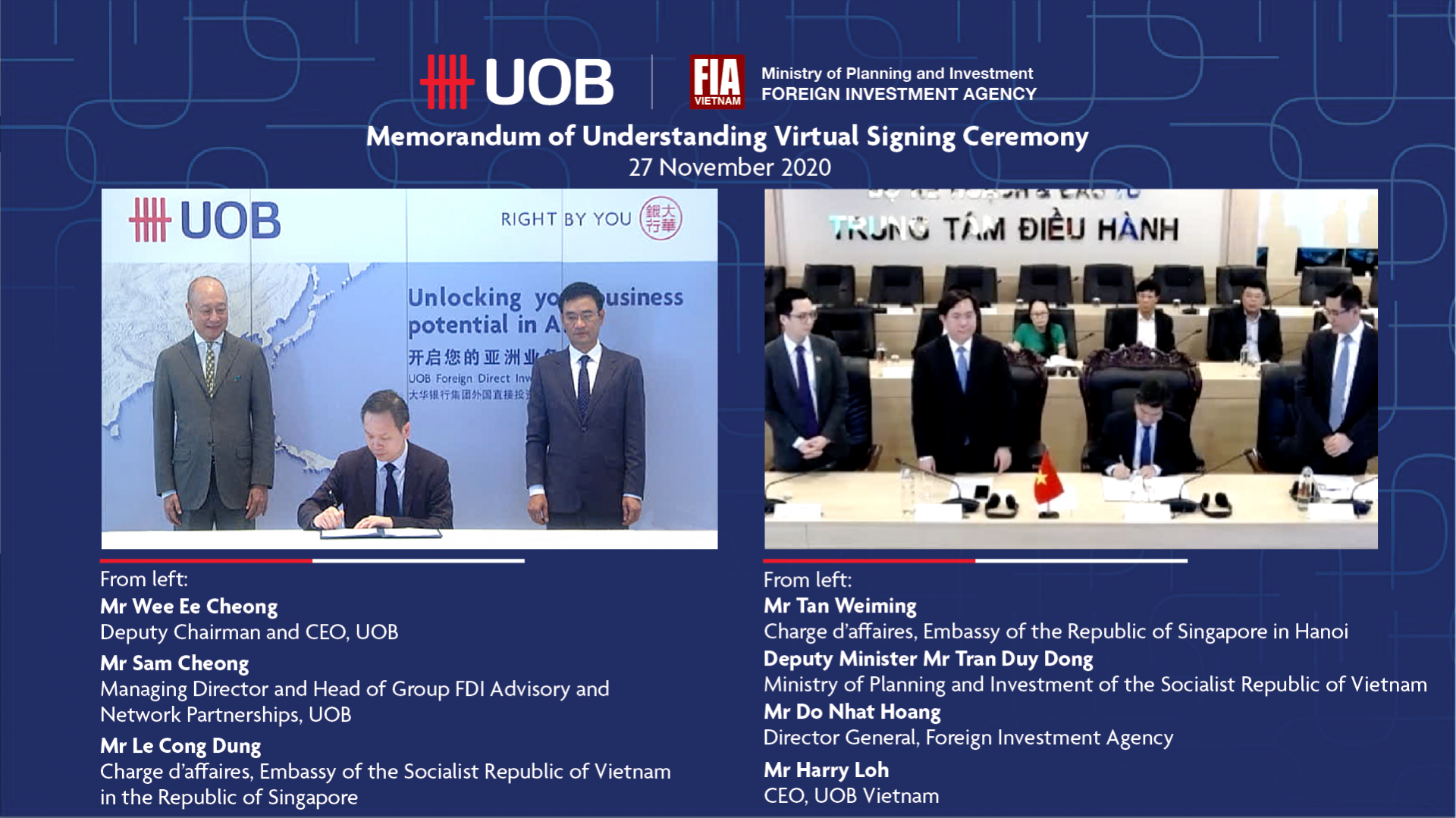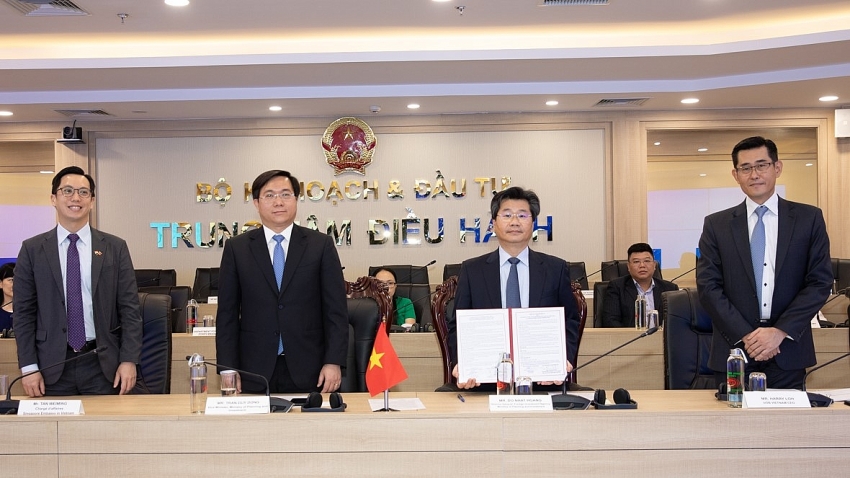UOB secures more than $2 billion of FDI into Vietnam
 |
The bank and Vietnam’s Foreign Investment Agency under the Ministry of Planning and Investment signed an expanded MoU, which will see the bank facilitating an additional pipeline of more than S$1.5 billion ($1.1 billion) in FDI into Vietnam.
Vietnam received close to $14 billion in disbursed foreign direct investment (FDI) in the first nine months of the year across all industries and UOB is helping companies from across the region ride on the momentum, focusing on high-growth sectors. These are the sectors that the Vietnamese government seeks to develop, namely sustainable energy, manufacturing, infrastructure, healthcare, and technology.
Tapping into the trade corridors between ASEAN and Greater China, UOB has helped more than 150 companies seize opportunities in Vietnam and aims to double the number as part of the latest MoU. As part of the value chain, small- and medium-sized enterprises (SMEs) which support these sectors will also benefit.
More than 2,000 jobs in Vietnam are also forecast to be created from the next wave of investments. This is on top of the more than 17,000 jobs already created under the first MoU. More Singaporean companies are also expected to invest into Vietnam as part of increased business and closer ties between the two countries.
UoB’s own ties with Vietnam began in 1993 when the bank opened its representative office in the country. UOB remains the first and only Singapore bank to establish a foreign-owned subsidiary in the country, doing so in 2018.
Wee Ee Cheong, deputy chairman and CEO of UOB, said, “At UOB, we have been steadfast in our support of Vietnam’s economic development since establishing our roots in the country almost 30 years ago. Over the years, we have experienced first-hand the rise of Vietnam, driven by a strong economy that is set to become the fourth largest in ASEAN by the end of this year."
“The expanded MoU with the Foreign Investment Agency (FIA) reaffirms our close and collaborative relationship in helping regional companies tap into Vietnam’s vibrant economy, driving their sustainable advancement and boosting trade flows and job creation across ASEAN. With the seamless connectivity and sectoral expertise we offer throughout our regional network, UOB is well placed to support companies looking to diversify their supply chains amid disruptions caused by the global pandemic," he added.
UOB Vietnam has three offices, two in Ho Chi Minh City and one in Hanoi, which provide financial solutions that are essential to the different life and business stages of consumers and companies in Vietnam. Its digital presence is established through the bank’s award-winning mobile banking app, UOB Mighty. In 2013, UOB set up a dedicated FDI Advisory team in Vietnam as part of broadening its support for regional clients investing into the country.
Tran Duy Dong, Deputy Minister of Planning and Investment in Vietnam, said, “Vietnam’s economic strength and stability continue to make it a top FDI destination for global enterprises, driven by business opportunities arising from its young population, educated workforce and rising middle class. Many enterprises are also looking to invest and to expand deeper into Vietnam, encouraged by our advanced manufacturing capabilities and technological innovations in fast-developing cities beyond the traditional FDI destinations of Ho Chi Minh City and Hanoi."
“Through the expanded MoU with UOB, we believe more enterprises will be able to ride on Vietnam’s growth and tap opportunities across the entire country. The MoU also signifies our strong and longstanding collaboration with UOB to drive more FDI into Vietnam," Dong emphasised.
Under the MoU, the FIA will also provide companies referred by UOB with advisory on investment policies and dedicated support in investment procedures and applications. The UOB FDI Advisory team provides companies from across the bank’s network with local insights, market entry support and customised financial solutions, and connects them to regional business opportunities.
UOB FDI Advisory and the FIA will also conduct webinars with speakers from the bank’s ecosystem partners, including government agencies, consulting firms and multinational companies to share their expertise and best practices on investing in Vietnam.
The MoU signing ceremony was conducted virtually, attended by senior Vietnamese government officials and senior leaders from UOB.
Helping companies to expand their operations into Vietnam
Vietnam continues to be an attractive destination for FDI, with an average of 9 per cent growth in FDI inflows from 2015 to 2019. The country’s attractiveness to foreign investors remained unabated amid the COVID-19 pandemic, registering a GDP growth of 2.62 per cent in the third quarter of 2020 even as economies in the region contracted.
 |
| UOB facilitating additional pipeline of more than S$1.5 billion ($1.1 billion) under expanded MoU with the FIA |
With Singaporean businesses listing Vietnam as their top market for overseas expansion, UOB will continue to work with Singaporean government agencies and trade associations to facilitate investments into Vietnam. Sembcorp is one of the companies with whom UOB has been working closely in Vietnam to support its industrial park projects.
Kelvin Teo, CEO, Sembcorp Development, said, “Vietnam is a key market for Sembcorp Development. We operate 10 integrated townships and industrial parks in Vietnam under our VSIP joint ventures, of which three were launched these couple of years. UOB has supported Sembcorp’s growth in the country and we are happy to build on our strong partnership while expediting sustainable urban solutions as part of Vietnam’s industrialisation.”
UOB has also assisted startups and SMEs from across ASEAN in their ventures into Vietnam. In 2019, UOB connected Ruangguru, an Indonesian startup providing education technology solutions, to the FIA to facilitate its setting up of operations in Vietnam, in addition to supporting its local banking needs.
This year, UOB also assisted Esco Lifesciences Group, a Singaporean life-sciences company, to expand their business in Vietnam by providing banking solutions to support its local operations and cross-border trading activities, as well as to help it manage foreign exchange risks.
What the stars mean:
★ Poor ★ ★ Promising ★★★ Good ★★★★ Very good ★★★★★ Exceptional
 Tag:
Tag:
Related Contents
Latest News
More News
- GE HealthCare showcases latest imaging innovations in Vietnam (January 19, 2026 | 11:56)
- BIM and ISO 19650 seen as key to improving project efficiency (January 17, 2026 | 10:45)
- US-Vietnam partnership targets tilapia development and soy-based aquafeed trade (January 16, 2026 | 16:50)
- Vietnam, UN strengthen cooperation in digital technology, AI (January 16, 2026 | 16:48)
- Shopee and TikTok Shop account for 8 per cent of Vietnam’s retail market (January 16, 2026 | 00:00)
- Sanofi, Long Chau Pharmacy relaunch medicine blister pack collection initiative (January 15, 2026 | 15:35)
- Viet Industry 2026 exhibition scheduled for September (January 09, 2026 | 09:51)
- Cathay kicks off ‘80 Years Together’ anniversary celebrations (January 08, 2026 | 11:05)
- Electronics drive Vietnam’s trade growth as exports hit record in 2025 (January 07, 2026 | 10:23)
- Vietnam’s domestic market to grow 10-12 per cent from 2026-2030 (January 06, 2026 | 17:58)





























 Mobile Version
Mobile Version